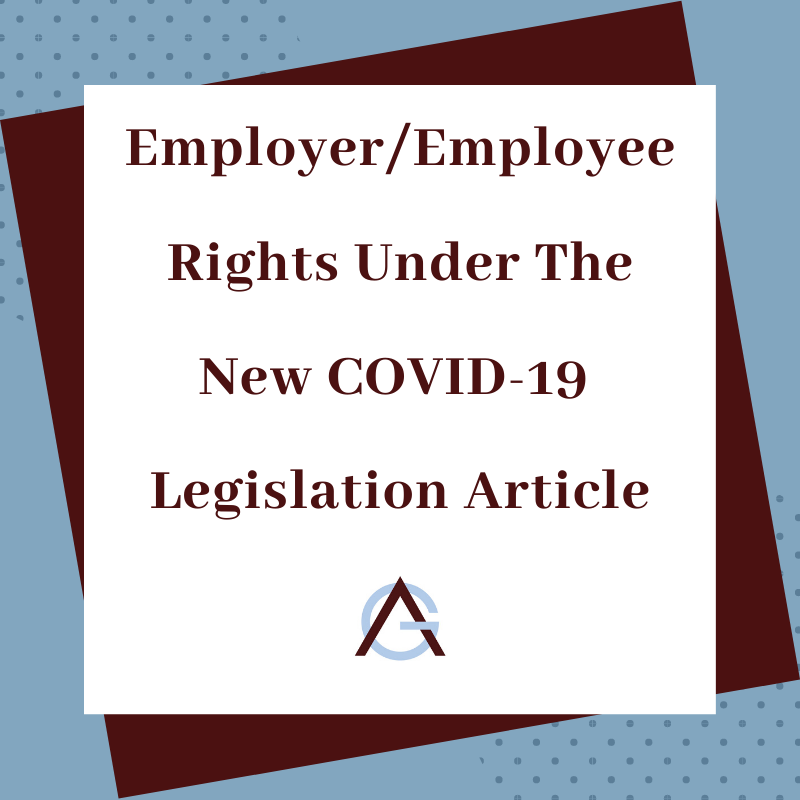In times of crisis, such as the current COVID-19 pandemic, it is important for both employers and employees to understand their rights and obligations. In this article, we will explore the key legal aspects related to employer/employee rights that are affected by the new COVID-19 legislation.
Understanding the New COVID-19 Legislation: What it Means for Employers and Employees
The new COVID-19 legislation has brought about significant changes in the way that employers and employees are able to interact and operate in the workplace. These changes include:
- Expanded Family and Medical Leave Act (FMLA) leave
- Emergency Paid Sick Leave
- Expanded Unemployment Insurance benefits
- Worker's Compensation benefits
Employer/Employee Rights Under the New COVID-19 Legislation
Perhaps one of the most significant changes brought about by the new COVID-19 legislation is an expansion of the Family and Medical Leave Act (FMLA) leave. Under this new legislation, employers with fewer than 500 employees (which includes businesses with fewer than 50 employees) will be required to provide up to 12 weeks of FMLA leave to employees who have been impacted by COVID-19, either because they have been diagnosed with the virus or because they need to stay at home to care for someone who has been diagnosed with the virus.
In addition to this, the new legislation also provides for Emergency Paid Sick Leave, which provides employees with up to 80 hours of paid leave if they are unable to work due to the virus or because they are caring for someone who has been affected by the virus.
Expanded Unemployment Insurance benefits are also available to employees who have been laid off or whose hours have been reduced due to COVID-19. Workers' Compensation benefits are also available to employees who have contracted the virus while on the job.
Employee Rights and Employment Law
Employment law is a complex area of the law that deals with the relationship between employers and employees. In order to understand the legal aspects of employer/employee rights, it is important to understand the different types of employment laws that exist.
Some of the most common types of employment laws include:
- Wage and Hour Laws - These laws govern the payment of wages and hours worked, including minimum wage, overtime pay, and break times.
- Non-Discrimination Laws - These laws prohibit employers from discriminating against employees on the basis of race, color, sex, religion, age, and other protected characteristics.
- Family and Medical Leave Laws - These laws provide employees with the right to take leave from work for certain medical or family reasons.
- Workers' Compensation Laws - These laws provide workers with benefits if they are injured or become ill while on the job.
- Occupational Safety and Health Laws - These laws require employers to provide a safe working environment for their employees.
Understanding Employee Benefits Law
Employee benefits law is another important area of the law that deals with the various benefits that employers offer to their employees. These benefits can include health insurance, retirement plans, and other types of benefits that are designed to attract and retain employees.
The Understanding Employee Benefits Law book, authored by experts in the field, provides an in-depth look at the many complex legal issues that arise in the context of employee benefits. This book is an invaluable resource for anyone who wants to understand the legal aspects of employee benefits.
Employment Law Tips for Small Businesses
Small businesses face many unique legal challenges related to employer/employee rights. In order to avoid legal issues, it is important for small business owners to be proactive and to stay informed about the latest legal developments.
Some key tips for small businesses include:
- Develop a comprehensive employee handbook
- Stay up-to-date with all applicable employment laws and regulations
- Keep detailed records of all employee interactions and transactions
- Seek legal guidance when necessary
By following these tips, small business owners can help to ensure that they are in compliance with all relevant employment laws and that they are able to avoid legal issues related to employer/employee rights.
Conclusion
The new COVID-19 legislation has brought about significant changes in the way that employers and employees are able to interact and operate in the workplace. It is important for both employers and employees to understand their rights and obligations under the new legislation in order to ensure compliance with the law and to avoid legal issues. By staying informed about the latest legal developments and seeking legal guidance when necessary, employers and employees can help to ensure that they are able to navigate this challenging time successfully.



